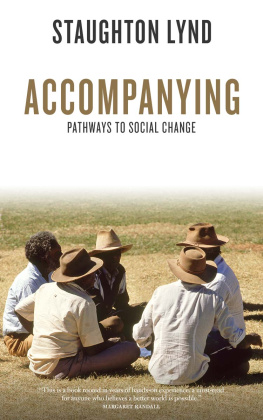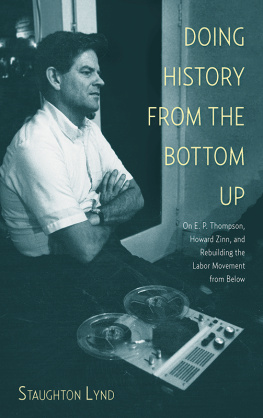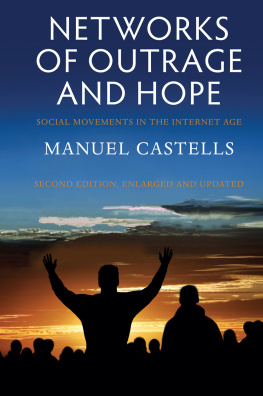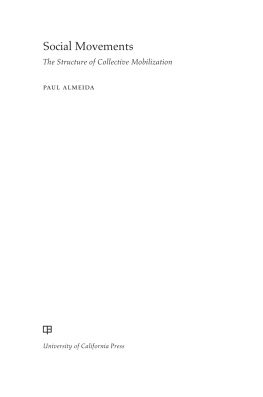PRAISE
In this moving and provocative book, Staughton (and Alice) Lynd lay out a unique way of looking atand makingsocial change. Not some people going out and trying to tell others what to do, but what he calls accompaniment: people finding each other and working together on the basis of equality, listening, consensus-seeking, and taking exemplary action. It may sound like a fairy tale, but the stunning stories he tells from his own and others experience show it can come true.
Jeremy Brecher, author of Strike!
Accompanying, or taking the same risks as others, is a powerful concept which turns upside down the traditionaland failedstyle of organizing hierarchically. Be forewarned, Accompanying is only for those who are ready to engage themselves. There are no ready-made answers here, only rich experiences to build on so as to persevere in maintaining our common humanity.
Sam Bahour, coeditor with Alice and Staughton Lynd of Homeland: Oral Histories of Palestine and Palestinians
Here is an activist life profoundly distilled: the wisdom and experience of half a century of movements from below, offered by one of the great radical thinkers and doers of our time. Staughton Lynd is a treasure and so is this precious book.
Marcus Rediker, coauthor of The Many-Headed Hydra and author of The Slave Ship and The Amistad Rebellion: An Atlantic Odyssey of Slavery and Freedom
Since our dreams for a more just world came crashing down around us in the late 1980s and early 1990s, those of us involved in social activism have spent much of the time since trying to assess what went wrong and what we might learn from our mistakes. In this highly readable book, Lynd explores the difference between organizing and accompanying. This book is a must read for anyone who believes a better world is possible.
Margaret Randall, author of Sandinos Daughters Revisited: Feminism in Nicaragua and Gathering Rage: The Failure of 20th Century Revolutions to Develop a Feminist Agenda
I like this book very much. The fact that it is based on Alice and Staughtons own experiences of accompanying makes it a very valuable tool for understanding and promoting the notion.
Father Joe Mulligan, SJ
Accompanying is inspiring and humbling to all who think we know and have a strategy to craft a better society. This stirring work shows us that solidarity is not an abstract strategy requiring a professional party leading the way to consolidate working class power.
Immanuel Ness, editor of Working USA and coeditor of Ours to Master and to Own: Workers Control from the Commune to the Present
Accompanying is a concept, a way of living, central to some of the best radical work the world over, one that opens up new possibilities for human liberation. Lynds delineation of accompanying is one that activists will do well to examine. It will benefit anyone wishing to live a life of meaning for the benefit of the underprivileged who strive always for a better world, and for the ongoing efforts to create that world.
Andy Piascik, former staff member of the League for Industrial Democracy
Accompanying is arguably the most thoughtful examination of Archbishop Oscar Romeros concept of accompaniment insofar as it helps us to understand how liberation theology matured from taking a preferential option for the poor to companionship with the poor as they organize themselves. This legacy flows into the Occupy Movement today when it reclaims foreclosed homes, and occupies banks and spaces collectively and spontaneously. This book would be important at any moment in history, but is indispensable today as we accompany one another in the quest to free ourselves from the shackles of the world the 1 percent has inflicted on us.
Carl Mirra, author of The Admirable Radical: Staughton Lynd and Cold War Dissent, 19451970
Everything that Staughton Lynd writes is original and provocative. This little book is no exception. Among his greatest contributions on display here is the transformation of the organizer and organized into a collaboration of different people with different skills, each making a decisive contribution.
Paul Buhle, author of Robin Hood: Peoples Outlaw and Forest Hero
Staughton and Alice Lynds theory and practice of accompaniment as set forth in this book represents a major contribution to understanding how activists should work for social change.
Jules Lobel, president, Center for Constitutional Rights and author of Success Without Victory: The Long Road to Justice in America

Accompanying: Pathways to Social Change
2012 Staughton Lynd
This edition 2012 PM Press
All rights reserved. No part of this book may be transmitted by any means without permission in writing from the publisher.
ISBN: 978-1-60486-666-7
LCCN: 2012913636
Cover design by John Yates/stealworks.com
Interior design by Jonathan Rowland
PM Press
PO Box 23912
Oakland, CA 94623
www.pmpress.org
10 9 8 7 6 5 4 3 2 1
Printed on recycled paper by the Employee Owners of Thomson-Shore in Dexter, Michigan.
www.thomsonshore.com
Contents
Introduction
T HIS L ITTLE B OOK O FFERS A S INGLE S IMPLE T HESIS.
I believe that most (not all) of the movements of the 1960s suffered from a mistaken and superficial conception of social change that we called organizing.
In what follows, I will discuss many aspects of this organizing model. For the moment, think of it as a process whereby person A decides what it would be desirable for person B to think and do, and then seeks to bring about that predetermined result.
Why do I call this idea of organizing mistaken and superficial? Because, as I shall seek to show, the result is either (as in the labor movement) a complex and restrictive institutional environment that stands in the way of creative and spontaneous action from below, or (in the heartbreaking case of the civil rights movement) a situation such that when the organizer leaves, some of the worst aspects of the way things were before reassert themselves.
Is there an alternative, a different practice, a new vision toward which young people who wish to change the world in fundamental ways might turn? I believe that there is. It is called accompaniment.
Dr. Paul Farmer on Accompaniment
The idea of accompaniment has lately begun to attract attention in the United States.
On May 25, 2011, for example, Dr. Paul Farmer delivered a commencement address at Harvard Universitys Kennedy School of Government called Accompaniment as Policy. In the course of his address, reproduced by the Office of the Special Envoy for Haiti, by my count Farmer used the French noun accompagnateur (one who accompanies) seven times, the verb accompany eight times, and the noun accompaniment thirty-seven times.
What did Dr. Farmer mean by these fifty-two words?
In 2003, a biography of Dr. Farmer had appeared with the title Mountains Beyond Mountains. the aspect of a victory lap for Farmer and the organization he cofounded, Partners In Health. Then, of course, came the Haitian earthquake, validating the proverb that author Tracy Kidder chose for the title: beyond each mountain range there is another; or, stated differently, as you solve one problem, another presents itself.
Dr. Farmer makes clear in the first paragraph of his Harvard talk that the aftermath of the Haitian earthquake was for him an object lesson about the arena he thought he knew most about. In discussing the things he learned and relearned during these difficult years, he states that [a]ll of them turn about the notion of accompaniment. The word accompaniment is an elastic one: it means just what youd imagine, and more.















